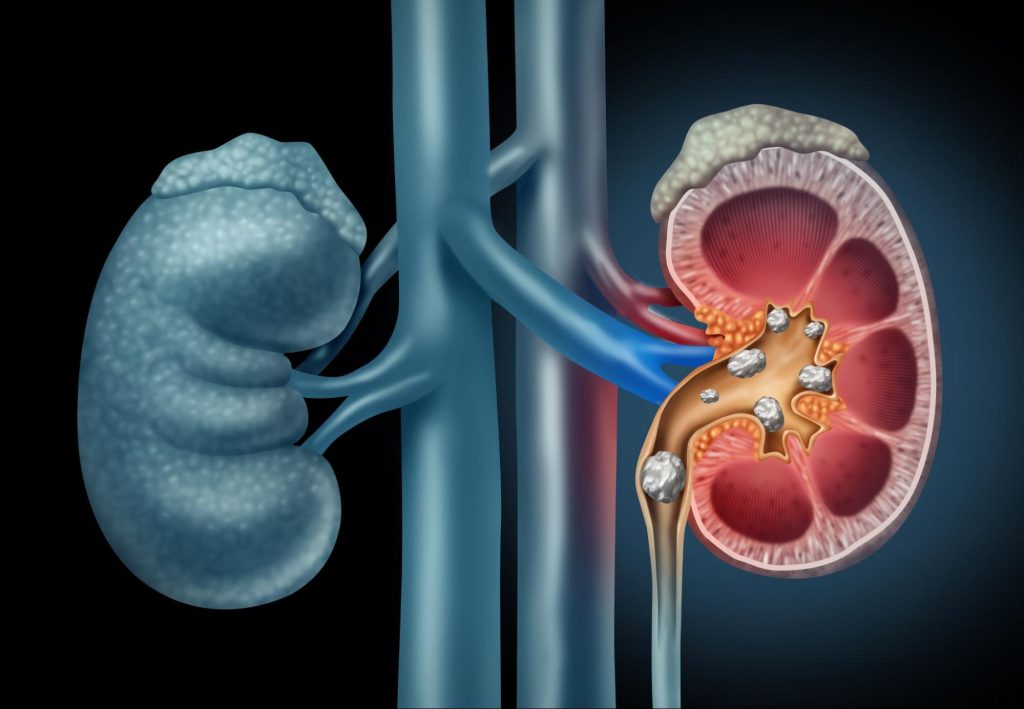
When it comes to kidney stones, many patients aren’t sure which specialist to see for treatment. While a nephrologist specializes in diseases of the kidneys, urologists provide comprehensive care of the genitourinary system. Even though kidney stones form in the kidneys, they are passed with urine, making a urologist an ideal provider to diagnose and treat. This blog provides a guide to this common condition and explains how a urologist can help with kidney stones.
What are Kidney Stones?
A kidney stone is a cluster of chemicals that form and harden into a mass in the urine. They typically occur when too much waste is in the urine and is stored in the kidneys. The stone will remain in the kidneys and grow in size unless it is passed with urine. Kidney stones can form in various sizes, with some being as small as a grain of sand and others as large as a golf ball. Symptoms of kidney stones vary with the size of the kidney stone but can include a combination of physical symptoms and urinary symptoms. Physical symptoms include fever, severe pain on either side of the lower back, nausea, vomiting, and stomach pain, and urinary symptoms include a low volume of urine, frequent urination, or having cloudy, bloody urine, or urine that has a bad odor.
What Causes Kidney Stones?
Kidney stones are caused by a high concentration of crystal-forming waste substances in the urine. Normally these substances are flushed out by fluids that prevent crystals from forming. A stone is formed when there are not enough fluids to dilute those substances. The risk of developing kidney stones is increased by dehydration, obesity, UTIs, and maintaining a diet that is too high in protein, sodium, oxalate, or calcium. A family or personal history of kidney stones, hyperparathyroidism, and any digestive diseases or surgeries may also make kidney stones more likely.
How a Urologist Can Help with Kidney Stones
Both a nephrologist and a urologist can help with kidney stones, but a urologist may be better suited for the job in more severe cases. Nephrologists are well-equipped to treat kidney stones that are small enough to pass through the urinary tract, in addition to prescribing medicines that may help prevent stones from forming. When it comes to large, complex, or reoccurring kidney stones, urologists tend to have more surgical training that can break up or remove larger kidney stones.
Urologists receive specialized training to carry out necessary surgeries to treat conditions ranging from kidney stones to kidney, bladder, testicular, and prostate cancers. Urologists also specialize in diagnosing and treating other urologic conditions, including urinary incontinence, pelvic health conditions, and male reproductive issues. On the other hand, nephrologists focus on conditions that impact kidney function, such as diabetes, high blood pressure, inflammation of the kidneys, and chronic kidney disease. They specialize in diagnosing in managing kidney disease through non-surgical medical therapies.
Kidney Stone Testing and Treatment
Another way a urologist can help with kidney stones is through testing and treatment. If your symptoms suggest you may have kidney stones, your doctor will examine you and call for diagnostic testing. Some of the primary tests used at Alliance Urology include urine testing, blood testing, stone analysis, or other imaging tests such as X-rays, CT scans, ultrasounds, or intravenous urography. Treatment will then depend on the size of the kidney stone. Drinking significant amounts of water can flush out the urinary system and pass any small stones, or your doctor may prescribe an alpha-blocker to help the stone pass. As we previously mentioned, a urologist can provide the best treatment for larger kidney stones. Procedures for more severe kidney stone cases include breaking up the stone with sound wave technology or surgical removal of the stones. No matter how severe the case is, the providers at Alliance Urology are here to help.
Make an Appointment
To diagnose and treat any common problem related to the bladder or genitourinary system, schedule an appointment with one of our providers. Our team has years of experience treating issues pertaining to the urinary tract and bladder. Alliance Urology Specialists can also explain how a urologist can help with kidney stones and provide treatment. For questions and inquiries, please call our office in Greensboro at (336) 274-1114.

